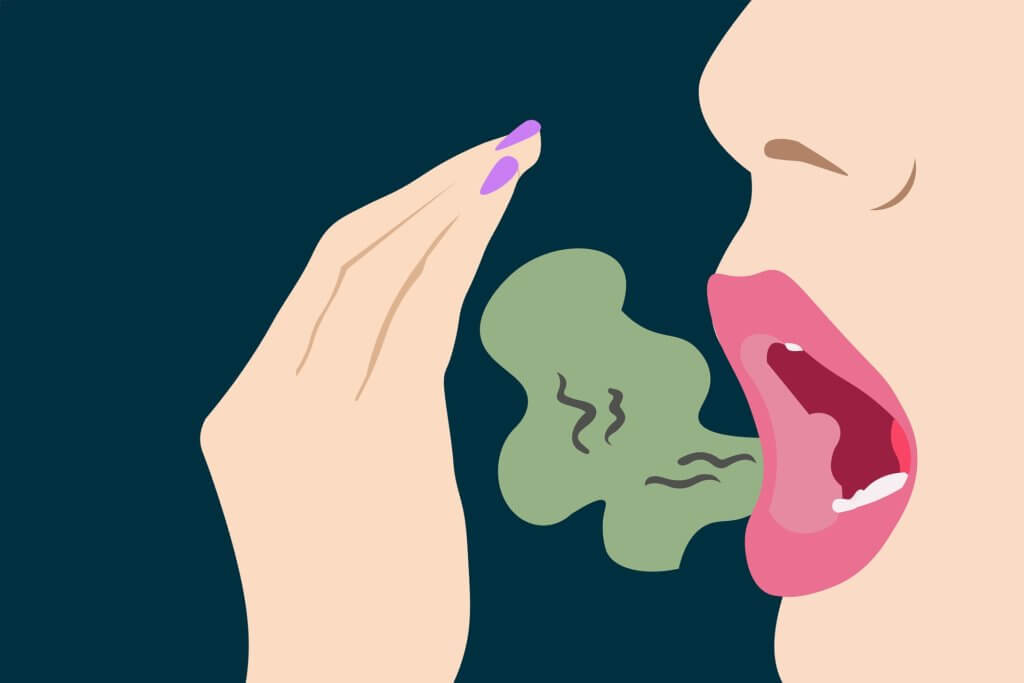You may think that bad breath is an issue for the dentist, not the doctor. Generally speaking, this is true. Dealing with a decaying tooth is no fun at all, but it may be the least concerning reason for a miasma in your mouth. Ongoing bad breath can be a sign of serious illness.
What is Normal?
It is generally assumed that morning breath is normal and may have a slightly unpleasant smell. This is a fairly regular occurrence because the mouth produces less saliva. At the same time, we sleep, which means that the bacteria that normally live in our mouths, left over from food particles, have an opportunity to multiply and grow. Brushing in the morning removes this bacterial build-up, freshening our breath again.
The most obvious and common cause of bad breath is the health and hygiene of your teeth and gums. Gum disease (gingivitis) and tooth decay both cause bad smells. When food breaks down in the mouth and isn’t removed by your twice-daily brushing, the bacteria begin to build up, creating an unpleasant odour.
If you brush twice a day and floss regularly, however, this should not be a problem. If you are taking care of your teeth but still experiencing halitosis, it may be a sign of a more serious issue.
It’s difficult to assess the freshness of your own breath. If you think you have a problem but aren’t sure, consider asking a friend or partner for their honest opinion. If you have persistent bad breath, it is recommended that you consult a doctor for a professional opinion.
Here are the top 5 reasons for bad breath that have nothing to do with your teeth:
1. DIGESTIVE DISORDERS
Bad breath can be a sign of a range of digestive disorders, each with its unique causes and triggers.
HEARTBURN – also sometimes called GERD, or GORD (gastro-oesophageal reflux disease) is a condition where the stomach acid travels upwards instead of down, and is linked to bad breath.
SIBO – this condition refers to an overgrowth of bacteria in the Small Intestine, and is linked with serious conditions such as irritable bowel syndrome, chronic fatigue, Crohn’s, and fibromyalgia. SIBO can cause bad breath. Other symptoms of SIBO include digestive symptoms such as diarrhoea or constipation, wind (flatulence), abdominal pain and cramping, as well as other symptoms like fatigue, rash, and lung issues.
H. PYLORI – The H. pylori bacteria occur naturally in the stomach. Still, if they overgrow, they can cause serious problems, such as peptic ulcers, GERD, and stomach inflammation, and are often found in the stomach lining in cases of stomach cancer.
H. pylori is a cause of bad breath and is accompanied by symptoms such as abdominal or stomach pain, nausea, pain after eating, or pain that goes away with eating, bloating, belching, weight loss, or loss of appetite.
2. DIABETES
Diabetes doesn’t necessarily cause bad breath, but the ketones released in the breath as a result of inadequate insulin production can give your breath a fruity smell, or an odour not unlike nail polish remover. If you notice this, it is worth getting a check-up and a blood test to check whether you are at risk of Type 2 Diabetes. Diabetes wreaks havoc on your health, but is preventable and reversible with lifestyle changes.
3. KIDNEY FAILURE
If your breath has a fishy, ammonia-like smell (similar to urine), it could indicate chronic kidney failure, which is a serious side effect of diabetes. This occurs when the kidneys become damaged and are unable to perform their function of filtering toxins from the blood. This has negative effects on many of the body’s systems, including the respiratory system, which is why the effects can show up as bad breath.
4. LUNG DISEASE
Respiratory infections can give you bad breath due to the high number of bacteria hanging out in your airways when you’re sick. However, bad breath is increasingly being used as a diagnostic factor in infections such as bronchitis, flu, pneumonia, and lung cancer.
5. LIVER DISEASE
Liver failure and cirrhosis can cause a range of unpleasant odours, from musty-sweet to rotten. This is different to the fruity smell of diabetic ketones, less sweet, and more decayed.

















